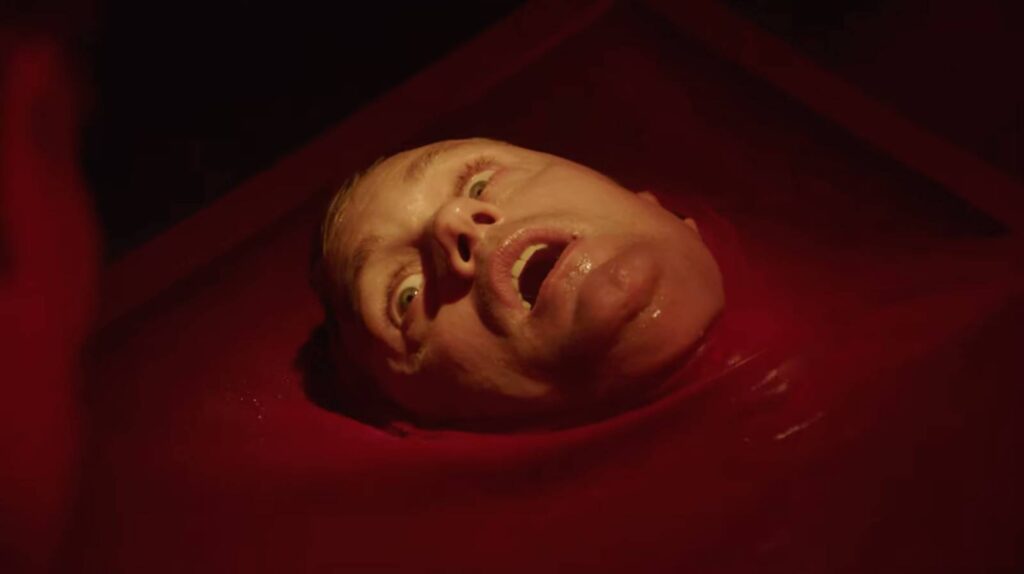
If Brandon Cronenberg is anxious about being compared to his father, he’s doing a good job hiding it. His prior feature, the art-house hit Possessor, leveraged the metamorphic gifts of Andrea Riseborough (newly minted Oscar nominee!) for a sordid story of corporeal invasion and existential agony. Now he returns with Infinity Pool, a wild and grimy phantasmagoria full of damaged bodies and deranged images. It may lack the deceptive polish of his pop’s best work, but it rivals him for sheer nastiness.
This is a matter of theme as well as form. In broad terms, Infinity Pool is a crude satire of white privilege and colonialist prerogatives. It’s set in the fictional country of Li Tolqa—filming took place in Croatia and Hungary, but the looming specter of “rainy season” suggests Southeast Asia—which attracts tourists with its opulent resorts and sandy beaches, but which someone ominously describes as “uncivilized.” The movie’s premise, which stirs echoes of last year’s Dual (and also The Prestige), revolves around a particularly perverse kind of black market: When interlopers break the law and find themselves subject to the third-world nation’s draconian justice system, they can evade punishment by paying the authorities (embodied by a louche Thomas Kretschmann) a hefty fee to manufacture a double—a perfect recreation endowed with their memories as well as their appearance—who will then suffer the death sentence in their stead. The only catch (OK fine, there are lots of catches) is that they must bear witness to their doppelganger’s execution.
As a send-up of entitled elites—look at these rich assholes with their noxious superiority, their utter lack of scruples!—this concept is less provocative than tiresome. But as the basis for a twisty thriller, it carries some promise, and at times Cronenberg harnesses its potential for complexity and surprise. There are some teasing philosophical questions (“You ever wonder if you’re the real you?”) and some clever fakeouts; when one shocking killing is revealed to be just another pantomime, I was tempted to join in the characters’ admiring applause.

The man who sits at the center of this disturbing arrangement—and who also simultaneously occupies both ends of its spectrum that runs from pleasure to anguish—is James (Alexander Skarsgård), a failed novelist whose marriage to the beautiful Em (Cleopatra Coleman) is as rocky as his writing career. (When someone asks James how he makes a living without selling any books, Em helpfully supplies, “He married rich”; later, when someone wonders how she fell for such a layabout, we learn the answer is “daddy issues.”) He’s theoretically using this vacation to search for inspiration, which really means he’s just spending his wife’s money. In an early scene of our unhappy couple dining on a balcony, the camera rotates on its axis, signaling Cronenberg’s intent to turn his characters’ lives—and his viewers’ stomachs—upside-down.
Trouble emerges in the person of Gabi (Mia Goth), the rare fan of James’ work who appeals to his vanity and convinces him to leave the cozy confines of the resort for some unauthorized sightseeing. Following an eventful day that features a lot of boozing, a discreet handjob, and a mangled pedestrian, James’ ennui is replaced by a feverish rush of new sensations: terror, excitement, guilt, lust. His life is now constantly in danger, but at least he’ll have something to write about.

Presumably, Cronenberg has designed Infinity Pool as a macabre meditation on a classic ethical question: How would you act if you never faced any consequences for bad behavior? Here, the answer is less interesting than you might hope. Sure, James and Gabi get up to a great deal of mischief—kidnappings, beatings, shootouts, orgies—but little of it unfolds with any purpose or suspense. The sour aftertaste of nihilism is no doubt intentional, but “Nothing means anything!” is a faintly childish insight, one made no more mature by the application of constant violence and periodic misery.
Perhaps recognizing the flimsiness of his material, Cronenberg attempts to compensate with energetic, excessive style. The results are uneven, if rarely unmemorable. He manages to lend seemingly ordinary sequences an uncomfortable charge—for simple dialogue exchanges, he often deploys extreme close-ups of lips and eyes, turning his actors’ faces into monuments—and some of his images are undeniable in their potency. The straightforward scene of James and Gabi sharing drinks is backlit by a cobalt night sky that glows with menace, while the late shot of a helpless man suckling a blood-smeared breast is majestically revolting.

Yet much of Cronenberg’s technique is just willfully unpleasant. As James descends deeper into mayhem and madness, the editing grows correspondingly more jagged and disorienting, with haphazard cuts and blurred visuals. This hallucinogenic overload is surely meant to mirror our (anti)hero’s fraying state of mind, but while certain sights are indelible—nipples, in particular, function as darkly lit symbols of desire and depravity—the overall atmosphere becomes one of pointless grotesquerie.
This sense of swirling chaos is heightened, with conviction if not coherence, by Goth, who renders Gabi an agent of impetuous destruction; her performance isn’t remotely credible in traditional terms, but it at least harmonizes with Cronenberg’s gonzo approach. Next to her, the strapping Skarsgård seems poor and pitiable, given that he’s tasked with approximating a real person in a movie that exhibits no interest in real people. He does his best, but he ultimately proves to be little more than a vehicle for (and a target of) his director’s cruelty. There may be an actual infinity pool at the resort, but the title is really just another thing for Cronenberg to warp, taking sadistic pleasure as he drowns his leading man in eye-catching, unending filth.
Grade: C+
Jeremy Beck is the editor-in-chief of MovieManifesto. He watches more movies and television than he probably should.
